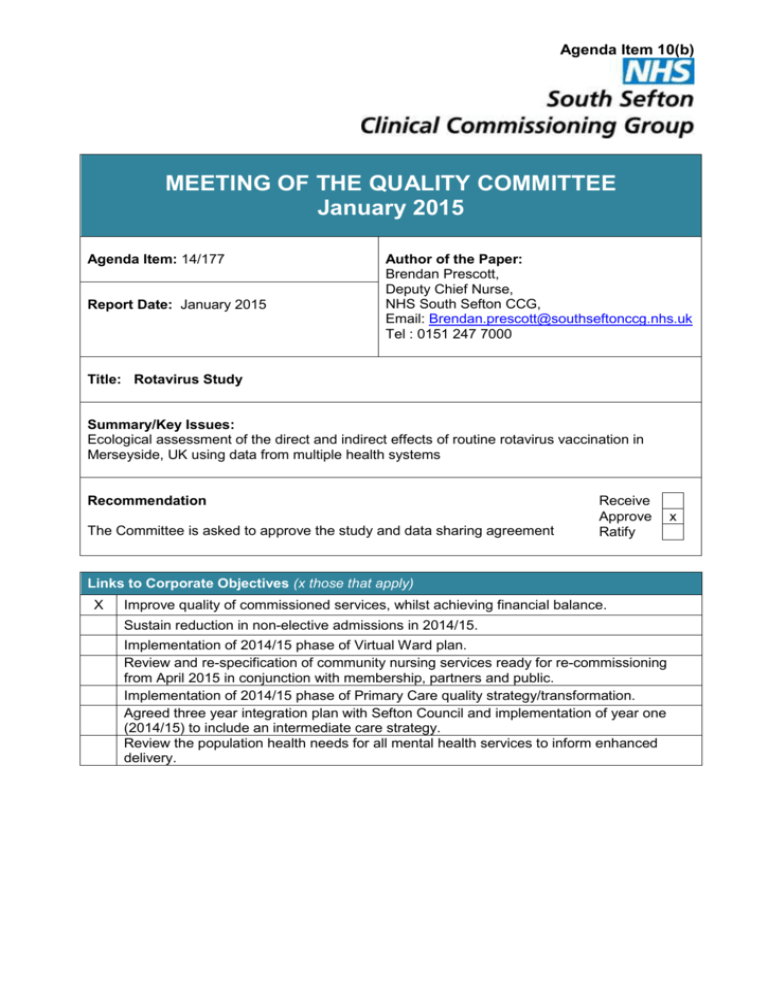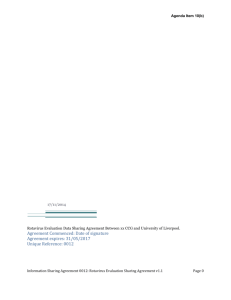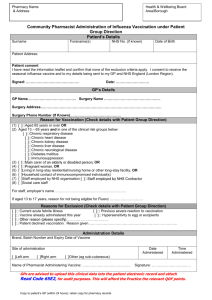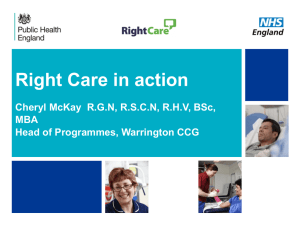MEETING OF THE QUALITY COMMITTEE January 2015
advertisement

Agenda Item 10(b) MEETING OF THE QUALITY COMMITTEE January 2015 Agenda Item: 14/177 Report Date: January 2015 Author of the Paper: Brendan Prescott, Deputy Chief Nurse, NHS South Sefton CCG, Email: Brendan.prescott@southseftonccg.nhs.uk Tel : 0151 247 7000 Title: Rotavirus Study Summary/Key Issues: Ecological assessment of the direct and indirect effects of routine rotavirus vaccination in Merseyside, UK using data from multiple health systems Recommendation The Committee is asked to approve the study and data sharing agreement Receive Approve Ratify Links to Corporate Objectives (x those that apply) X Improve quality of commissioned services, whilst achieving financial balance. Sustain reduction in non-elective admissions in 2014/15. Implementation of 2014/15 phase of Virtual Ward plan. Review and re-specification of community nursing services ready for re-commissioning from April 2015 in conjunction with membership, partners and public. Implementation of 2014/15 phase of Primary Care quality strategy/transformation. Agreed three year integration plan with Sefton Council and implementation of year one (2014/15) to include an intermediate care strategy. Review the population health needs for all mental health services to inform enhanced delivery. x Agenda Item 10(b) Process Yes No Patient and Public Engagement Clinical Engagement N/A Comments/Detail (x those that apply) x x Equality Impact Assessment x Legal Advice Sought x Resource Implications Considered x Locality Engagement x Presented to other Committees x Links to National Outcomes Framework (x those that apply) Preventing people from dying prematurely Enhancing quality of life for people with long-term conditions Helping people to recover from episodes of ill health or following injury X Ensuring that people have a positive experience of care X Treating and caring for people in a safe environment and protecting them from avoidable harm Agenda Item 10(b) Report to the Quality Committee January 2015 1. Executive Summary Rotavirus is the most common cause of severe gastroenteritis in infants and young children worldwide. Currently 67 countries include rotavirus vaccine in childhood immunisation programmes, but uptake in Western Europe has been slow. In July 2013 rotavirus vaccine was introduced into the UK’s routine childhood immunisation programme. Prior to vaccine introduction in the UK rotavirus was estimated to result in 750,000 diarrhoea episodes and 80,000 GP consultations each year, together with 45% and 20% of hospital admissions and emergency department attendances for acute gastroenteritis, in children under five-years of age. It is therefore important to assess vaccine impact in the UK, to support continued vaccination and to inform rotavirus immunisation policy in other Western European countries. 2. Introduction and Background Rotavirus vaccination was introduced for babies last year. The evaluation is looking at the impact of the vaccine on the whole community—not just on hospital admissions for babies but on levels of sickness across all ages. The evaluation wants to assess to see if rotavirus vaccination of babies actually reduces the whole burden of rotavirus and diarrhoea across the whole community, adults and children of all ages. The results should be very valuable to determine to what extent the vaccination has benefited the people of South Sefton and beyond, including impact on GP consultations and hospital admissions. Further information on the study is provided in Appendix 1. 3. Key Issues There is a requirement for an information sharing agreement between General Practice, NHS South Sefton CCG and the University of Liverpool. Appendix 2 proposes the data sharing agreement and this will need to be completed by individual constituent practices and the University of Liverpool. 4. Recommendations The Committee is recommended to approve the study and proposed data sharing agreement. Appendices 1. Study Summary 2. Data Sharing Agreement Brendan Prescott January2015 Appendix 1 document1 Print date: 09 February 2016 3 Agenda Item 10(b) Ecological assessment of the direct and indirect effects of routine rotavirus vaccination in Merseyside, UK using data from multiple health systems Dan Hungerford1,4 (d.hungerford@liverpool.ac.uk, 0151 795 9609 (corresponding author), Dr Roberto Vivancos4, Professor Neil French1,3, Dr Miren Iturriza-Gomara1, Professor Nigel Cunliffe1,2 1. Department of Clinical Infection, Microbiology & Immunology, Institute of Infection and Global Health, University of Liverpool, Liverpool, L69 7BE, UK 2. Alder Hey Children’s NHS Foundation Trust, Liverpool, L12 2AP, UK 3. Royal Liverpool and Broadgreen University Hospitals NHS Trust, Prescot St, Liverpool, L7 8XP, UK 4. Public Health England, Field Epidemiology Services, Liverpool, L1 1JF, UK Project summary Rotavirus is the most common cause of severe gastroenteritis in infants and young children worldwide. Currently 67 countries include rotavirus vaccine in childhood immunisation programmes, but uptake in Western Europe has been slow. In July 2013 rotavirus vaccine was introduced into the UK’s routine childhood immunisation programme. Prior to vaccine introduction in the UK rotavirus was estimated to result in 750,000 diarrhoea episodes and 80,000 GP consultations each year, together with 45% and 20% of hospital admissions and emergency department attendances for acute gastroenteritis, in children under fiveyears of age. It is therefore important to assess vaccine impact in the UK, to support continued vaccination and to inform rotavirus immunisation policy in other Western European countries. In Merseyside, UK a research team from the University of Liverpool and Public Health England will conduct an observational study using a before and after and cohort approach to examine changes in gastroenteritis and rotavirus incidence following the introduction of rotavirus vaccination. Data will be collected on mortality, hospital admissions, nosocomial infection, emergency department attendances, GP consultations and community health consultations to capture all healthcare providers in the region. Vaccine uptake will be collected from Child Health Information Systems. We will assess both the direct and indirect effects of the vaccine on the study population. Comparisons of outcome indicator rates will be made in relation to vaccine uptake and socioeconomic status. The study has been approved by NHS Research Ethics Committee, South Central-Berkshire REC Reference: 14/SC/1140. The study has also been registered on the NIHR LCRN portfolio. There will be no primary recruitment and data collection. All data used for the study will be secondary data from routine health systems. Data will be pseudoanonymised so that identification of participants will not be possible for researchers. The study will demonstrate the impact of rotavirus vaccination on the burden of disease from a complete health system perspective. GP practice data collection – Liverpool CCG specifications How will the data be collected:The extract parameters are below Search population: Currently registered patients (Excluding dummy patients) Search date: Day of extraction document1 Print date: 09 February 2016 4 Agenda Item 10(b) Date range: Last 7 years initially - 1st January 2007 – 31st July 2014 then two subsequent extracts covers data for previous 12-months. 1st August 2014-31st July 2015 and 1st August 2015-31st July 2016 Age range: all ages Fields for extraction: 1. Patient Details Unique anonymous patient ID Lower Super Output Area of residence MM/YYYY of Birth or age in months Gender Practice N82 number 2. Read codes Diarrhoea Time since last diarrhoea episode Diarrhoea symptom NOS Enteritis due to rotavirus Infectious diarrhoea Diarrhoea and vomiting Diarrhoea of presumed infectious origin Viral Gastroenteritis Infectious gastroenteritis Infantile viral gastroenteritis Gastroenteritis - presumed infectious origin Gastrointestinal symptoms NOS First Rotavirus Vaccination Second Rotavirus Vaccination Rotavirus vaccination given by other health care provider 19F2 19F5 19FZ A0762 A082 19G A083 A07y0 A0803 A07y1 A0812 19Z 65d0 65d1 65d2 Appendix 2 Rotavirus Vaccine Evaluation document1 Print date: 09 February 2016 5 Agenda Item 10(b) Project: Rotavirus Vaccine Evaluation Version: 1.1 Summary and Benefits of the Project This document outlines the requirements for an information sharing agreement between General Practice, NHS South Sefton CCG and University of Liverpool. The aim of this data sharing project is to enable the sharing of data to inform the evaluation of rotavirus vaccine which was introduced in July 2013. The aim of this evaluation is to: • Understand if there any benefits to be gained through vaccinating children against rotavirus • Quantify any benefits or disbenefits identified. This document contains the file specification for the fields required from primary care together with a Sharing Agreement detailing how the information will be transmitted, stored and used by both NHS South Sefton CCG and University of Liverpool. Appendix A shows a diagram of the data flow, the governance principles and who has access at each point. Change History Version Date 1.0 Author Details 08/10/2014 LB Document created 1.1 17/11/2014 LB Expiry date amended, dates of extraction added, extraction field and University of Liverpool details confirmed. Extraction method Signed up GP Practices will allow the extraction of patient level data via EMIS Web to be used only for the purposes within this Information Sharing Agreement (ISA). Extract Frequency Three data extractions will be performed. The first will occur in December 2014, the second extract will occur in August 2015. The third and final extract will be performed during August 2016. Extract Parameters The extract parameters are below Search population: Currently registered patients (Excluding dummy patients) Search Date: Day of extraction Date range: Where Indicated - Last 7 years initially Each subsequent extract covers data for previous 12-months. document1 Print date: 09 February 2016 6 Agenda Item 10(b) Fields for extraction: Registration status Post Code* Date of Birth* Gender Diarrhoea 19F2 All instances & dates Time since last diarrhoea episode 19F5 All instances & dates Diarrhoea symptom NOS 19FZ All instances & dates Enteritis due to rotavirus A0762 All instances & dates Infectious diarrhoea A082 All instances & dates Diarrhoea and vomiting 19G All instances & dates Diarrhoea of presumed infectious origin A083 All instances & dates Viral Gastroenteritis 07y0 All instances & dates Infectious gastroenteritis A0803 All instances & dates Infantile viral gastroenteritis A07y1 All instances & dates Gastroenteritis - presumed infectious origin A0812 All instances & dates Gastrointestinal symptoms NOS 19Z All instances & dates 3.6 Rotavirus vaccination (Code & Date) and data management The data extraction from EMIS web will be stored temporarily on the CCG secure network for the purposes of transmission to the University of Liverpool. The patient identifiable items within the dataset (DOB and postcode) will be transformed prior to data sharing. This means that postcode will be converted to Lower Super Output Area (LSOA) and date of birth will be converted to age in months. The data will be transmitted to University of Liverpool in the form of batches of CSV files via the CCG Patient Identifiable Data (PID) NHS net account (liverpool.pid@nhs.net). This is an acceptable form of data transmission of patient identifiable data. The information will then be deleted from the CCG network. For security features of this process please see Governance and Security section below. To understand Data Management process - see below. Governance and Security Data Governance document1 Print date: 09 February 2016 7 Agenda Item 10(b) It is essential that all processing and use of personal data is in line with the Data Protection Act. In order to protect the rights of individuals there is a statutory duty placed on those who decide ‘how’ and ‘why’ such data is processed – the ‘data controller’. The data controller for this extraction is the GP Practice as they are the statutory body. Therefore all proposed use of the data must be in agreement with GP practices. This essentially means that ALL decisions regarding the use of the data rest with the GP Practice. The data processors cannot utilise or disclose this information to a third party e.g., Department of Health, without your express permission, unless covered by the terms of this agreement. The information will only be used in accordance with the specific purpose that it is provided for and will be at all times treated as confidential and handled in a secure manner. The shared information will not be used for any of the following: • Advertising, Marketing & Public Relations • Trading/sharing in personal information • Future Research not covered by the parameters of this sharing agreement Legal basis for Information Sharing The information shared will not contain patient identifiable data items. The Health and Social Care Act 2012 also allows sharing of information for the purpose of advancing the health and wellbeing of the people in the area, to encourage persons who arrange for the provision of any health or social care services in that area to work in an integrated manner. Security of the servers/data warehouse Data will be extracted and warehoused on a secure server hosted and administered by University of Liverpool. The following security features are in place to ensure the data is secure. • Servers have routine, auditable back up procedure to prevent data loss • Secure anti-virus software • Servers in secure room with key access and log book for access • Building has swipe card access for every floor. • Computers have time out screens and screen lock functions for users. • Users have secure password to network • This process is regularly audited by external auditors to ensure fit for purpose Data Management The data extracted will be housed in a secure data warehouse as above. The University of Liverpool data governance practices, which are informed by the Data Protection Act (1998), will be rigidly adhered to. Retention period document1 Print date: 09 February 2016 8 Agenda Item 10(b) The data will be stored by University of Liverpool for 10 years after the expiry of this data sharing agreement (31/05/2017). No further data will be shared between the University of Liverpool and GP after the expiry of this data sharing agreement (31/05/2017). Subject Access Subject access requests will be dealt with by the data controller in accordance with the provisions of the Data Protection Act 1998. Complaints Complaints will be dealt with in accordance with NHS South Sefton CCG Complaints Policy. Transmission In line with Department of Health recommendations, the use of laptops or other portable media for storing/transferring person identifiable or other sensitive information is not allowed under this agreement unless it is encrypted to standards approved by the DoH. Data will be transmitted via approved secure routes in this case NHS net to NHS net or encrypted email. Information breaches Partners will take steps to avoid any breach (intentional or otherwise) or disclosure to third parties outside the remit of this Agreement. Breaches must be reported through to NHS South Sefton CCG Incident reporting procedures, fully investigated and a report provided to NHS South Sefton CCG. Any Serious Untoward Incidents occurring within the scope of the information shared under this agreement must be reported to the participating organisations within 1 day of the incident occurring. The SUI must be fully investigated. The GP practices reserves the right to be informed at every stage of the investigation. Disciplinary action will be the responsibility of the organisation where the incident has occurred. This agreement will be reviewed in light of any lessons learnt from such incidents. Information will only be accessible to those authorised by this agreement or for whom it is essential to access the information to complete the purpose of the sharing. Confidentiality Partner organisations must have confidentiality clause within staff contracts of employment and or require staff participating in this agreement to sign confidentiality agreements. Staff must have current CRB checks where agreements require the sharing of sensitive data in particular children’s data Where training needs to meet the requirements of this agreement are assessed and identified, each organisation will ensure that the resource is made available to staff. Patient Confidentiality document1 Print date: 09 February 2016 9 Agenda Item 10(b) Some patients may still wish to opt out of sharing data in the same way as they may have done for the national spine. Patients’ data will not be shared if the read codes of 93C3 (Refused consent for upload to national shared electronic record) and 93C1 (Refused consent for upload to local shared electronic record). Patients will also be hidden from the extract if a practice marks their records as ‘private’ from within the clinical system. Both methods are acceptable. Dissemination Copies of this agreement will be provided to each of the signatory organisations. A master copy will be held by NHS South Sefton CCG. NHS South Sefton CCG will support any changes or amendments to this agreement. This information sharing agreement will be adopted by the signatory organisations. Key staff will be identified in each organisation to ensure that the protocols in this agreement are adhered to. Information Governance All signatories to this agreement are required to have approved Information Governance Policies in place that state the legal, ethical and professional obligations to protect service user information. Signatories to this agreement must ensure that all staff, contractors or other third parties who are involved in the processing of information covered by this agreement have received appropriate Information Governance training. Monitoring & Review Review of this agreement will be overseen by NHS South Sefton CCG, with reference to the signatory organisations, and in particular if there are changes to the agreed purpose or processes. This document will also be reviewed whenever there are changes to legislation or guidelines that may affect the sharing of the information covered by the agreement. Staff are required to report any adverse incidents that may affect the validity of the statements in this agreement and any breaches of security or confidentiality to Information Intelligence Services at NHS South Sefton CCG. Any queries relating to this agreement should be addressed to NHS South Sefton CCG. This agreement will be sent to practices once Practices will be communicated to every two years providing them with an opportunity to opt out. Effective Date This ISA is considered to be effective following signature of all parties and from the date on the signature page of the agreement unless prior authorisation to share has been approved by the Caldicott Guardian. Information Sharing Agreement document1 Print date: 09 February 2016 10 Agenda Item 10(b) You agree to share the data specified within this sharing agreement for the purpose specified. NHS South Sefton CCG Signed ………………………… Designation…………………. Date of expiry 31/05/2017 University of Liverpool Signed ………………………… Designation…………………. Date of expiry 31/05/2017 GP Practice Name: Signed ………………………… Designation…………………. Date of expiry 31/05/2017 document1 Print date: 09 February 2016 11





